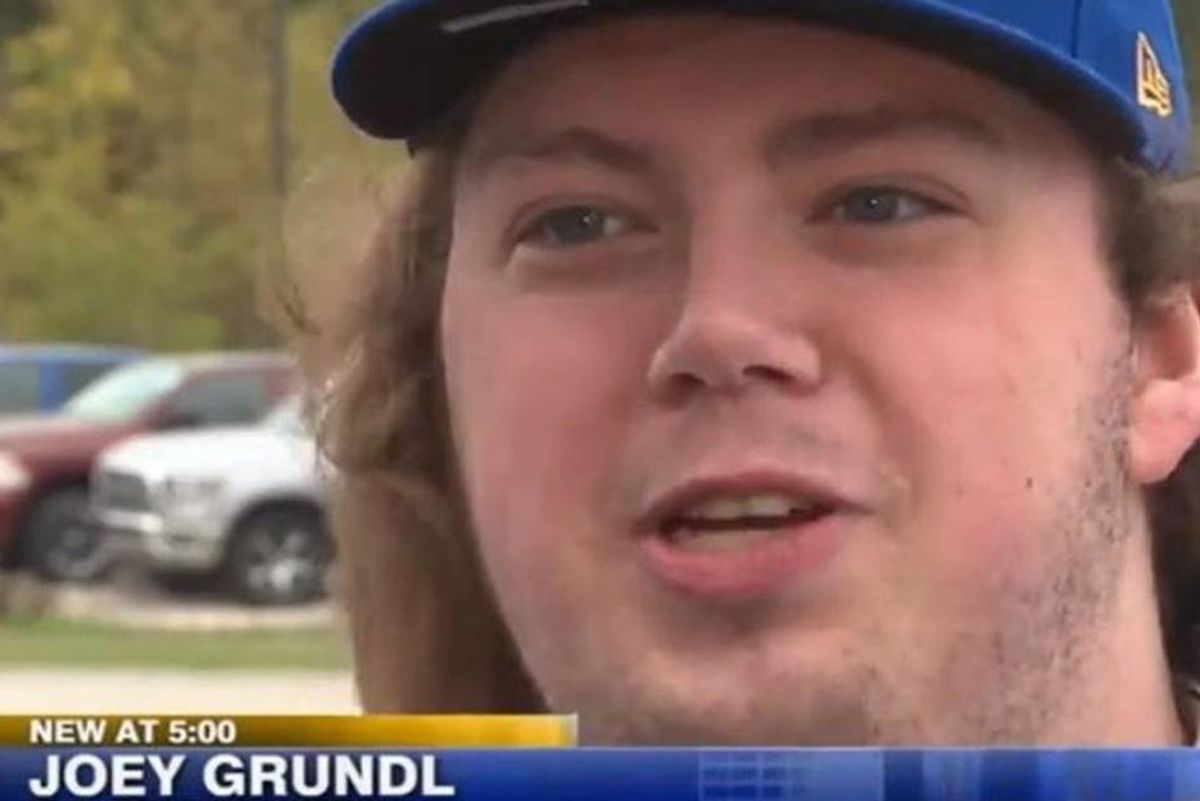Pizza guy whose quick thinking saved a woman's life gets the reward of a lifetime
He saw her trapped in her own home, begging for help.

Joey Grundl, Milwaukee pizza guy.
Joey Grundl, who was working as a pizza delivery driver for a Domino's Pizza in Waldo, Wisconsin, was hailed as a hero for noticing a kidnapped woman's subtle cry for help. It's a timeless story that continues to resonate with people today.
Back in 2018, the delivery man was sent to a woman's house to deliver a pie when her ex-boyfriend, Dean Hoffman, opened the door. Grundl looked over his shoulder and saw a middle-aged woman with a black eye standing behind Hoffman. She appeared to be mouthing the words: "Call the police."
"I gave him his pizza and then I noticed behind him was his girlfriend," Grundl told WITI Milwaukee. "She pointed to a black eye that was quite visible. She mouthed the words, 'Call the police.'"

The Dean Hoffmann mugshot.
When Grundl got back to his delivery car, he called the police. When the police arrived at the home, Hoffmann tried to block the door, but eventually let the police into the woman's home.
After seeing the battered woman, Hoffmann was arrested and she was taken to the hospital for her wounds.
Earlier in the day, Hoffman arrived at the house without her permission and tried to convince her to get back into a relationship with him. He then punched her in the face and hog tied her with a vacuum power cord.
"If you love me, you will let me go," she pleaded, but he reportedly replied, "You know I can't do that." He also threatened to shoot both of them with a .22 caliber firearm he kept in his car. The woman later told authorities that she feared for her life.
An alert pizza delivery driver helped save a woman from her abusive ex-boyfriend, police say. A 55-year-old Grafton man now faces several counts of domestic ...
A day later, Grundl was seen on TV wearing a hoodie from Taylor Swift's "Reputation Tour" and her fans quickly jumped into action, tagging Swift in photos of the hero. Grundl already had tickets to go to an upcoming Swift concert in Arlington, Wisconsin, but when Swift learned of the story, she arranged to meet Grundl backstage.
"She … she knew who I was," Grundl jokingly tweeted after the concert. "I'm thoroughly convinced Taylor gave me a cold."
"This has been one of the most exciting weeks of my life," Grundl said. "I'm legitimately getting emotional and I almost never get like this. But as the likely most memorable week of my entire life comes to an end … I guess I can really say … I'm doing better than I ever was."
- Kooky conspiracy theories are detracting from the very real issue of ... ›
- If you really want to #SaveTheChildren, stop sharing QAnon ... ›
- 5 incredible stories of missing kids that were rescued in the nick of ... ›
- 6-year-old girl stops her own kidnapping by biting him - Upworthy ›
- MrBeast advices influencers to be careful - Upworthy ›
- Parents won't let daughter attend Taylor Swift birthday party - Upworthy ›
- Man walking his dog sees the moment a 7-year-old slips into a river and rushes to save his life - Upworthy ›
- Pizzeria owner spots people eating from his dumpster, and has an entirely unexpected response - Upworthy ›



 Worried mother and children during the Great Depression era. Photo by Dorthea Lange via Library of Congress
Worried mother and children during the Great Depression era. Photo by Dorthea Lange via Library of Congress  A mother reflects with her children during the Great Depression. Photo by Dorthea Lange via Library of Congress
A mother reflects with her children during the Great Depression. Photo by Dorthea Lange via Library of Congress  Families on the move suffered enormous hardships during The Great Depression.Photo by Dorthea Lange via Library of Congress
Families on the move suffered enormous hardships during The Great Depression.Photo by Dorthea Lange via Library of Congress



 The Emperor Augustus.By Till Niermann/
The Emperor Augustus.By Till Niermann/ Many politicians make use of specific hand gestures when making speeches.brooke from atlanta/
Many politicians make use of specific hand gestures when making speeches.brooke from atlanta/ Napoleon crossing the Alps.Jacques-Louis David/
Napoleon crossing the Alps.Jacques-Louis David/ George Washington in the "Landsdowne portrait."By Gilbert Stuart/
George Washington in the "Landsdowne portrait."By Gilbert Stuart/ A famous statue of Mao Zedong in China.By Noel Hanna/
A famous statue of Mao Zedong in China.By Noel Hanna/ The iconic "Arnolfini portrait." By Jan van Eyck - Gennadii Saus i Segura/
The iconic "Arnolfini portrait." By Jan van Eyck - Gennadii Saus i Segura/